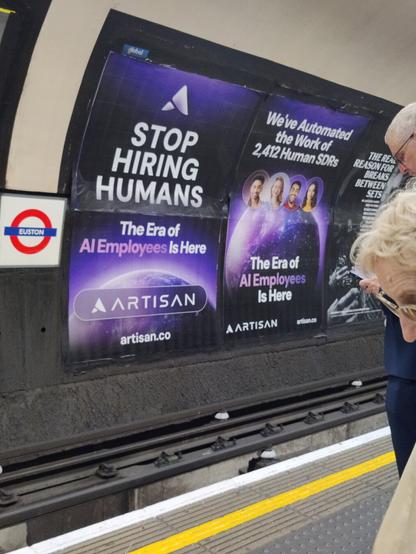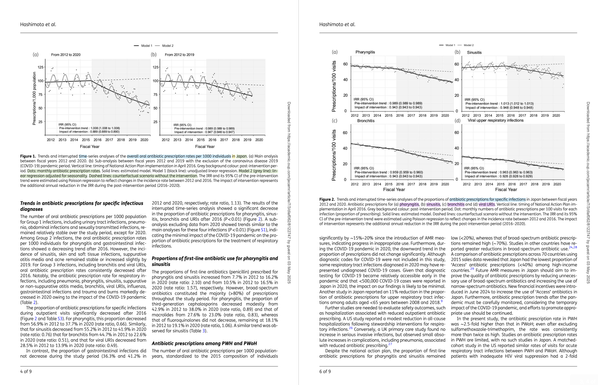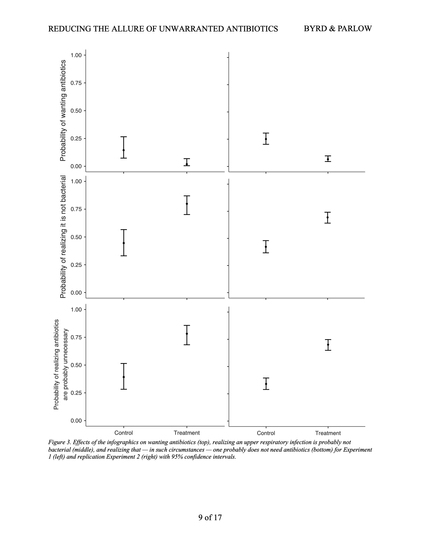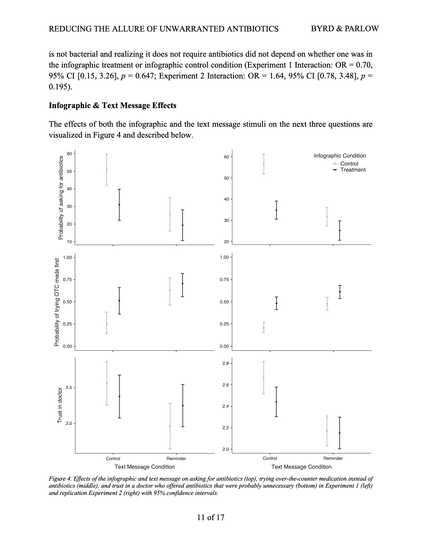#xRisk
Early antibiotic treatment in patients hospitalized with non-severe #COVID19 didn't improve outcomes — if anything, early #antibiotics were actually linked to *poorer* clinical outcomes.
https://doi.org/10.1001/jamanetworkopen.2025.11499
#AntibioticStewardship #AntimicrobialResistance #medicine #xRisk
#Japan launched a national plan to reduce #AntimicrobialResistance in 2016.
Data from 2012 to 2020 show a pretty clear, abrupt, and consistent reduction in overall and inappropriate #antibiotic #prescription corresponding to the launch.
The two most recent episodes of #BioUnethical with David Thorstad, Emily Largent, and @GovindPersad were very (very!) good.
Hosts Leah Pierson and Sophie Gibert may be doing reflective discussion better than anyone — outstanding stage setting, questioning, improvising, etc.
#bioethics #appliedEthics #Philosophy #medicine #health #biology #economics #law #psychology #epistemology #science #longtermerism #effectiveAltruism #xRisk #existentialRisk
Our latest preprint validates two low-cost global #risk reduction stimuli .
An infographic and a text message improved #antibiotic decisions in ways that could reduce existential risks of #AntimicrobialResistance.
https://doi.org/10.31234/osf.io/d2pc4_v1
Oilivia Parlow was a great advisee!
#AMR #xRisk #CogSci #Medicine #Edu #SciComm #GlobalHealth #bioethics #HealthPsychology #HealthEconomics #Pharmacy #CollectiveAction #nudge
75% of clinicians see inappropriate antibiotic prescribing as driven (in part) by delays in processing diagnostic tests or cultures.
This perception was 30% more prevalent in #PrimaryCare than #Hospitals (N = 180).
Someone on LinkedIn just criticised me for comparing the trillions dollars deficit Musk just promised if Trump is elected with the cuban missile crisis, because the latter was existential. But we need $7T to handle the climate crisis, it really is the same scale of #xrisk.
https://mapstodon.space/@zoom_earth/113395767797443004
Premise 1: multiple realizability — intelligence/consciousness can be realized in substrates besides human brains.
Premise 2: paperclip maximizer — an advanced artificial intelligence may annihilate humanity without intent if focused on a narrow goal like maximizing paperclips.
Conclusion: the global capitalist economy's singular focus on maximizing profit/shareholder return is an existential threat to humanity.
Well that's... interesting. 😏
https://www.wired.com/story/openai-superalignment-team-disbanded/
OpenAI’s Long-Term AI Risk Team Has Disbanded
"The entire OpenAI team focused on the existential dangers of AI has either resigned or been absorbed into other research groups, WIRED has confirmed."
Wonderful #80000hours podcast episode dumping buckets of cold water on all kinds of space hype with #SpaceBastard @ZachWeinersmith
I.e. why #SpaceColonization is no viable answer to #XRisk in the next hundred years.
https://80000hours.org/podcast/episodes/zach-weinersmith-space-settlement/
#XRisk is a bunch of privileged white folks being obsessed with stuff that's not actually even a risk, much less existential. They're literally spinning up imaginary people to pretend to save, while real people go hungry, die of disease, get murdered by genocidal regimes, etc. & somehow people seem to actually buy it.
Forecasting Research Institute published results today from 2023's adversarial collaboration about AI risk.
Intended to identify key drivers of disagreement and "crux" questions. (q's where there could be wide agreement on risk increase or decrease.)
It was intense, certainly. Hard to agree on cruxes and appear to be worldview differences.
#forecasting #AI #xrisk
https://forecastingresearch.org/news/ai-adversarial-collaboration
David Noble builds on the work of White and Ovitt to offer an account of what he terms “the religion of technology” which amounts to a pervasive intermingling of religious concerns with the project of technology as a well as a tendency to link the quest for transcendence to technology.From L.M. Sacasas's blog: https://thefrailestthing.com/2012/02/22/christianity-and-the-history-of-technology-part-one/ titled Christianity and the History of Technology, Part One
Sacasas has a newer Substack that goes into more recent events: https://theconvivialsociety.substack.com/p/secularization-comes-for-the-religion-6df . There are some great references in this newsletter, including American Technological Sublime by David Nye.
Nye tells a fascinating story about how Americans routinely experienced the advent of new technologies as encounters with the sublime. Not all technologies, of course, but Nye documents how technologies of a certain scale and dynamism elicited feelings of awe and wonder that could easily be described as religious in nature. Nye considers, for example, first encounters with the railroad, the factory, the Hoover Dam, the electrified cityscape, the Golden Gate Bridge, and, later, the atomic bomb and the launch of a Saturn V rocket during the Apollo program.
Nye shows that the experience of the technological sublime was incorporated into elaborate civic ceremonies and rituals that celebrated not only the technological marvel at hand, but also human ingenuity and the body politic.The broad argument is that technological development is a religion in the United States. This is not meant as a metaphor, but as a literal fact: how Americans treat technology is not like a religious activity, it literally is one. I think this goes a long way towards explaining why we're so weird about #tech here and now and especially why there are actual cults formed around it. Noble calls this phenomenon the "religion of technology" and spells out the connections. Sacasas weaves this together with modern developments.
Meghan O'Gieblyn makes these connections with modern developments as well, for instance in this talk God in the machine: https://www.youtube.com/watch?v=hTXleWp5fUA . So has Émile P. Torres: https://www.xriskology.com
#TESCREAL #longtermist #EffectiveAltruism #AI #xrisk
cc @timnitGebru@dair-community.social @xriskology@mastodon.bida.im
The National Institute of Standards and Technology (NIST) is facing an internal crisis as staff members and scientists have threatened to resign over the anticipated appointment of Paul Christiano to a crucial, though non-political, position at the agency’s newly-formed US AI Safety Institute (AISI), according to at least two sources with direct knowledge of the situation, who asked to remain anonymous.https://venturebeat.com/ai/nist-staffers-revolt-against-potential-appointment-of-effective-altruist-ai-researcher-to-us-ai-safety-institute/
Good for them! #longtermist / #EffectiveAltruist / #TESCREAL people are cultists and have no place in government. They're obsessed with fantasies like #xrisk that are disconnected from reality and distract from the actual harms #AI is already causing here on Earth. It's precisely the same phenomenon as holding endless discussions about how many angels can dance on the head of a pin while ignoring that people are suffering. It sounds like Secretary of Commerce Gina Raimondo might be a Kool-aid drinker herself or is sympathetic to the viewpoints of the Kool-aid drinkers.
From her Wikipedia entry:
Gina Marie Raimondo...an American businesswoman, lawyer, politician, and venture capitalistEmphasis mine.
It's alarming that this is even happening, and you know the fix is in because they tried to rush the appointment without informing staffers ahead of time. I hope #NIST staffers prevail.
cc: @timnitGebru@dair-community.social @xriskology@mastodon.bida.im
#GailBradbrook, #occupy er and founder of #ExtinctionRebellion warns against falling for the #AI #xrisk narrative 👏🏼https://www.buymeacoffee.com/gailbradbrook/the-messy-landscape-artificial-intelligence-ethics-risk-note-activists
It never ceases to annoy me that the people who fear #xrisk from #AGI essentially fear that some very smart #AI will subliminally persuade its creators and controllers to do things that enable it to escape their control and/or gain control over ‘real world' levers of power.
Meanwhile they dismiss the whole idea of current #LLMs having what mimics subtle agendas, grounded in how they have been trained, reinforcing established modes of thought TODAY in harmful ways.
This seems disconnected. 🧵
Would Turing have believed in xrisk, if he knew what we know now? Todd Holloway is expert in industrial-level #systemsAI; Dermot Turing on history of AI, including his uncle. Immodestly, I'd recommend our talk over Musk & Sunak's.
https://www.youtube.com/watch?v=o9bmWsJSocg
#xrisk #AISafetySummit #AIEthics #AISafety #systemsAI #devOps #systemsEngineering
A taxonomy of positions against #AI being an existential risk: https://www.lesswrong.com/posts/BvFJnyqsJzBCybDSD/taxonomy-of-ai-risk-counterarguments
What do you think? Please reshare!
#airisk #xrisk #artificialintelligence #machinelearning #ml

!["higher odds of poor clinical outcomes associated with receipt of CAP antibiotics using propensity score models (propensity-matched OR, 1.03 [95% CI, 1.01-1.05]; P = .003"](https://files.mastodon.social/cache/media_attachments/files/114/618/952/764/332/551/small/9f869575c629c449.png)




